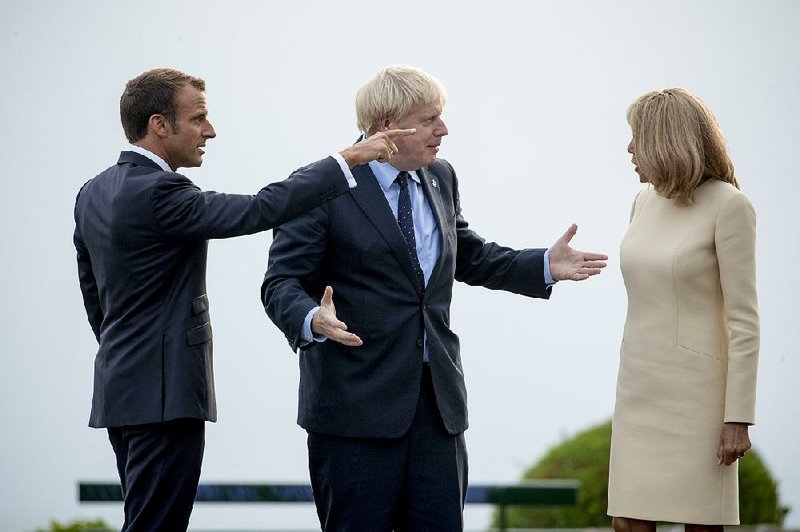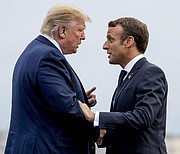BIARRITZ, France -- President Donald Trump asserted Saturday that he has the authority to make good on his threat to force all U.S. businesses to leave China, citing a national security law that has been used mainly to target terrorists, drug traffickers and pariah states such as Iran, Syria and North Korea.
As he arrived in France for the annual meeting of the Group of Seven powers, Trump posted a message on Twitter citing the International Emergency Economic Powers Act of 1977, a law originally meant to enable a president to isolate criminal regimes, not sever economic ties with a major trading partner over a tariff dispute.
"For all of the Fake News Reporters that don't have a clue as to what the law is relative to Presidential powers, China, etc., try looking at the Emergency Economic Powers Act of 1977," Trump wrote. "Case closed!"
The act gives presidents wide berth in regulating international commerce during times of declared national emergencies. Trump threatened to use those powers earlier this year to place tariffs on imports from Mexico in a bid to force the U.S. neighbor to do more to address illegal crossings at their shared border.
It was not immediately clear how Trump could use the act to force American businesses to move their manufacturing out of China and to the U.S. Trump has not declared an emergency with respect to China.
[Video not showing up above? Click here to watch » https://www.youtube.com/watch?v=7-SEZPeqK9E]
"Any invocation of the International Emergency Economic Powers Act in these circumstances and for these purposes would be an abuse," said Daniel Price, who was an international economic adviser to President George W. Bush. "The act is intended to address extraordinary national security threats and true national emergencies, not fits of presidential pique."
Under the weight of the trade war, China has fallen from America's largest trading partner last year to the third-largest this year. The United States remains China's largest trading partner. China said Friday that it would raise tariffs on U.S. goods in retaliation for Trump's latest levies, and Trump vowed hours later to increase tariffs even further.
China's Commerce Ministry issued a statement Saturday warning the United States to turn back from escalating the conflict, but it did not promise additional trade measures.
"This unilateral and bullying trade protectionism and extreme pressure violate the consensus of the heads of state of China and the United States, violate the principle of mutual respect, equality and mutual benefit, seriously undermine the multilateral trading system and the normal international trade order," the statement said.
U.S. business leaders warned that forcing companies to leave China would hurt the competitiveness of American industry and cause heavy financial losses.
"It's difficult to move out of China, and any time they are forced to do so by tariffs, this is a momentous act," said Ker Gibbs, president of the American Chamber of Commerce in Shanghai. "We are in no position to give up the China market -- it's too large, it's too important."
The president's threat to all but cut off one of America's most important trading relationships amid the trade war could disrupt the global economy while further unsettling companies in the United States that rely on China in their production of items such as clothing and smartphones.
"It's impossible for businesses to plan for the future in this type of environment," David French, senior vice president for government relations at the National Retail Federation, said in a statement.
The trade association CompTIA stressed the logistical strain that would follow if companies were forced to shift operations out of China, saying it would take months for most companies.
"Any forced immediate action would result in chaos," CEO Todd Thibodeaux said in emailed comments.
PRESIDENTIAL POWERS
Under the International Emergency Economic Powers Act, a president can declare a "national emergency" in case of "any unusual and extraordinary threat" to "the national security, foreign policy, or economy of the United States" from abroad. This triggers special authority for the president to regulate "any transactions in foreign exchange" by Americans.
The law was passed to define and restrain presidential power, which until then had been interpreted expansively under the Trading with the Enemy Act of 1917. The 1977 law has since served as the main source of authority for presidents to impose sanctions on countries or individuals in response to specific national security threats, such as the Iranian hostage crisis that began in 1979.
As of March 1, presidents had declared 54 emergencies under the law, of which 29 were still active, according to the Congressional Research Service. Presidents have used it to target international terrorists, drug kingpins, human-rights abusers, cyberattackers, illegal-arms proliferators and multinational criminal organizations.
Presidents invoked the law when Iraq invaded Kuwait in 1990, when Serbia sent troops into Kosovo in 1998 and when Russia annexed Crimea in 2014. Among the countries targeted have been international outliers such as North Korea, Sudan, Somalia, Yemen, Syria, Congo and Venezuela.
John Smith, a partner at the international law firm Morrison & Foerster, said the law had never been used for pure economic warfare without a national security nexus, adding it could be challenged in court or by Congress.
"In the 20 years I've been doing this, I have not seen anything where there was not a national security threat," said Smith, who until last year was director of the Treasury Department's Office of Foreign Assets Control, which enforces the emergency-powers law. "This is a completely different use of a well-utilized tool in going after what appears to be a purely economic dispute."
But even if it's an unprecedented stretch of the law, some international trade lawyers said it was written broadly enough that Trump could prevail.
"The statute gives the president the right to do just about anything if he or she first declares that here's a national security threat to the United States," said Judith Alison Lee, a lawyer at Gibson Dunn in Washington. "It would be hugely disruptive but, technically speaking, I think the statute gives him that authority."
William Reinsch, an international business scholar at the Center for Strategic and International Studies, said he did not think the act would allow Trump to order U.S. companies to leave China, but that he might be able to block future investments, freeze Chinese assets and exclude Chinese financial institutions from the U.S. financial system.
ECONOMIC TALKS
Tension over the global economy was likely to shadow Trump's meetings with leaders at the Group of Seven summit in France this weekend. Donald Tusk, president of the European Council, warned Saturday against "senseless disputes" and further economic conflict.
"Trade deals and the reform of the WTO are better than trade wars," he said, referring to the World Trade Organization. "Trade wars will lead to recession, while trade deals will boost the economy."
During a special meeting today about the state of the global economy, which was requested by the White House, Trump plans to use the forum to tout his economic record and criticize several allies for their slowing growth, according to senior administration officials who briefed reporters on the condition of anonymity.
The gathering will include leaders of all Group of Seven countries -- the United States, Japan, Canada, Italy, Germany, France and the United Kingdom.
Trump plans to again call out Germany for its trade practices, below-average defense spending and partnership with Russia on a gas pipeline, one official said. Trump will take on France for seeking to impose a "highly discriminatory" digital-service tax that targets U.S. companies, another official said.
During a lunch Saturday, French President Emmanuel Macron told Trump that the leaders needed to work on "how to decrease tensions and fix the situation in terms of trade." He also discussed the global economic slowdown, saying Europe needs "some new tools to relaunch our economy."
While Macron has sought to organize the Group of Seven around issues such as global inequality and development in Africa, Trump plans to use the gathering to press his "America first" agenda on trade and economic growth, officials said.
Shortly after the lunch, some senior administration officials said they were frustrated with how the French were handling the summit. Speaking on the condition of anonymity to talk frankly, two U.S. officials said they believed Macron was focusing on issues such as climate change, gender inequality and development in Africa to cater to his own domestic politics.
Trump's administration wants more focus on trade and the economy, the officials said.
One senior administration official offered a contrary view, saying the talks had been positive and constructive.
A French official denied reports of diplomatic tensions with the United States over the summit. The official, who spoke on the condition of anonymity to avoid escalating any conflict with the U.S. delegation, said leaders couldn't avoid discussing issues such as climate change at the summit.
In addition to the session on the economy, Trump is scheduled to discuss trade and other issues during bilateral meetings with the prime ministers of the United Kingdom, Japan and Canada today.
Information for this article was contributed by Peter Baker and Keith Bradsher of The New York Times; by Zeke Miller and Rachel Lerman of The Associated Press; and by Toluse Olorunnipa, Damian Paletta, Josh Dawsey and Michael Birnbaum of The Washington Post.
A Section on 08/25/2019

